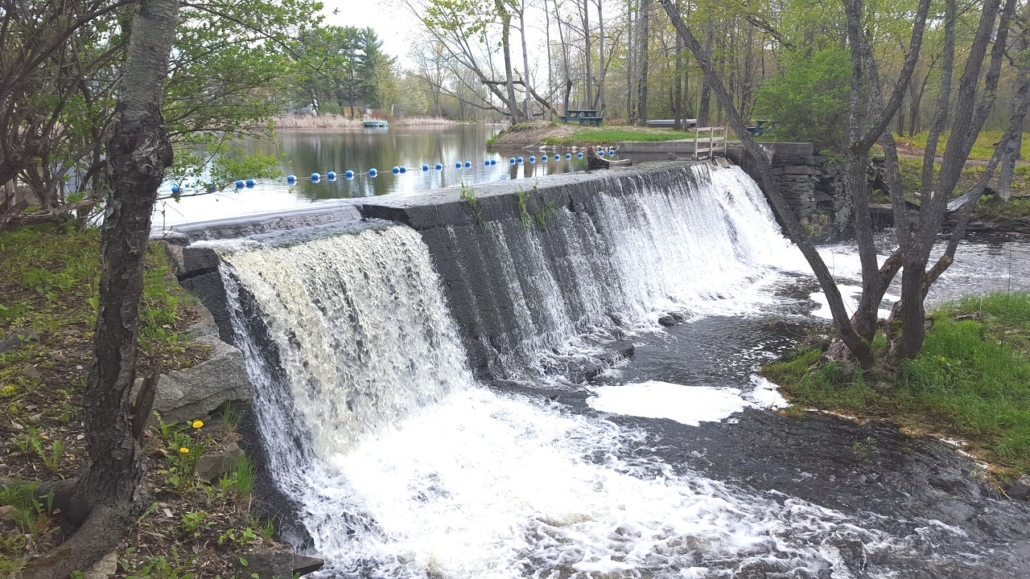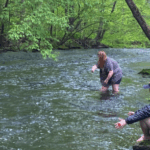Construction begins for alewives restoration at Ladd Dam in North Vassalboro
by Landis Hudson
The Ladd Dam, in North Vassalboro, will soon have a technical fishway installed to allow alewives to move past it to their spawning ground. It’s not the final step in the overall project, but a critical one, and scheduled to start this summer following plans developed by the Department of Marine Resources, and US Fish and Wildlife Service, working with local engineers and dam owner Ray Breton. Maintaining the Ladd Dam impoundment will keep the swimming area, a favorite spot on hot summer days.
The work is an important step in the Alewife Restoration Initiative which will re-establish passage from the ocean to China Lake. The goal of the project is to restore an annual migratory run of 800,000 – 950,000 adult alewives (river herring). Two dams have been removed to date, the Masse and Lombard Dams. The Ladd, Box Mill and Outlet Dams will be fitted with technical fishways. The Ladd Dam is located just upstream from the Box Mill Dam. The work is part of a greater Kennebec restoration effort that dates back to the 1980s. It builds on the success at Benton where alewife numbers were estimated at just 400,000 in 2008, but jumped to a record 5.7 million last year.
In March, Town of China voters approved $25,000 to support fish passage work at the Outlet Dam which controls the China Lake water level but does not allow alewives to make their way into or safely out of the lake. Fish have been stocked in China Lake by the Department of Marine Resources and can be seen schooling in the lake in large numbers through the late summer and into the autumn. Some fish are able to make their way out of the lake but the remaining dams lack fish passage to ensure their survival as they make their way downstream to the ocean.
Voters from the Town of Vassalboro will be asked to support the project as well by approving the transfer of revenue received by the town from the current alewife harvest at Webber Pond to support the work at Outlet Stream.
Restoring alewife runs contributes to the health of the entire Gulf of Maine because alewives are forage fish for the larger species including cod, haddock, tuna, striped bass — and food for eagles, ospreys, otters, and raccoons.
The nonprofit organization Maine Rivers has been coordinating the project. Chuck Verrill, president of Maine Rivers, sees long-term value in river and stream restoration. “It’s our hope that this work will provide benefits to future generations who will grow up seeing the stream come alive with an annual migration of fish.” Locally, community members are hopeful that the restoration work will help improve the water quality of China Lake that has suffered from algae blooms. The historical presence of alewives was reconfirmed with the discovery of letters and documents in the Massachusetts Archives.
The restoration of alewives to China Lake has been a priority for the Maine Department of Marine Resources for many years, based on agency goals to restore historic runs of this native species. This past spring, the Department stocked 25,000 native alewives directly into China Lake to jump-start restoration efforts. “We know this kind of work takes long-term vision and great attention to detail over several seasons. We are pleased to see this progress,” said Patrick Keliher, Commissioner, Maine Department of Marine Resources.
The project relies on partnerships and is supported by the Sebasticook Regional Land Trust, the China Region Lakes Alliance, the China Lake Association, Maine Rivers, the U.S. Fish and Wildlife Service, Maine Department of Marine Resources and the Towns of China and Vassalboro.
Funding has come from sources including: Patagonia, Maine Outdoor Heritage Fund, The Nature Conservancy in Maine, MNRCP, Natural Resource Conservation Service, Davis Conservation Foundation, and the Elmina B. Sewall Foundation.
Responsible journalism is hard work!
It is also expensive!
If you enjoy reading The Town Line and the good news we bring you each week, would you consider a donation to help us continue the work we’re doing?
The Town Line is a 501(c)(3) nonprofit private foundation, and all donations are tax deductible under the Internal Revenue Service code.
To help, please visit our online donation page or mail a check payable to The Town Line, PO Box 89, South China, ME 04358. Your contribution is appreciated!






Leave a Reply
Want to join the discussion?Feel free to contribute!